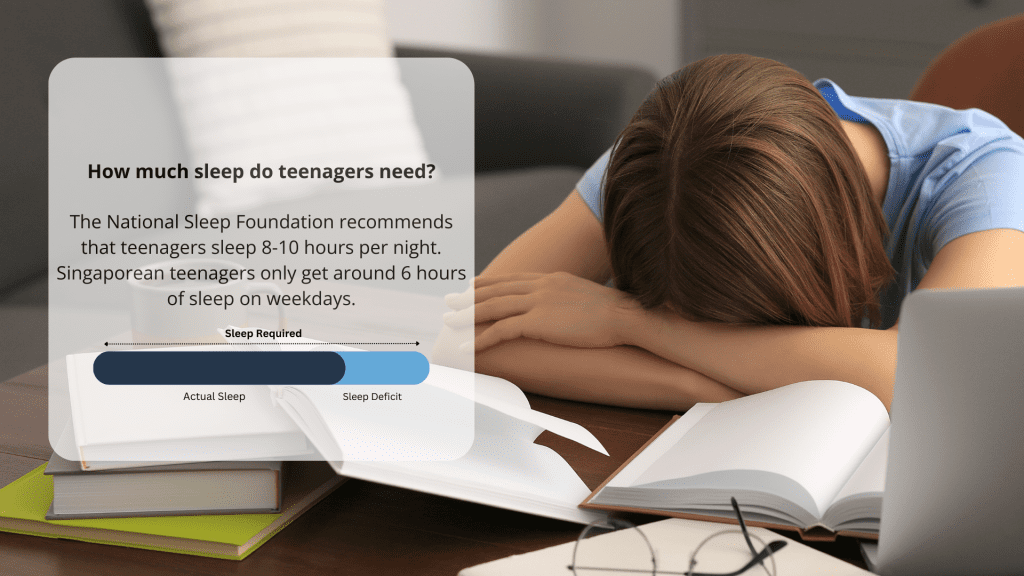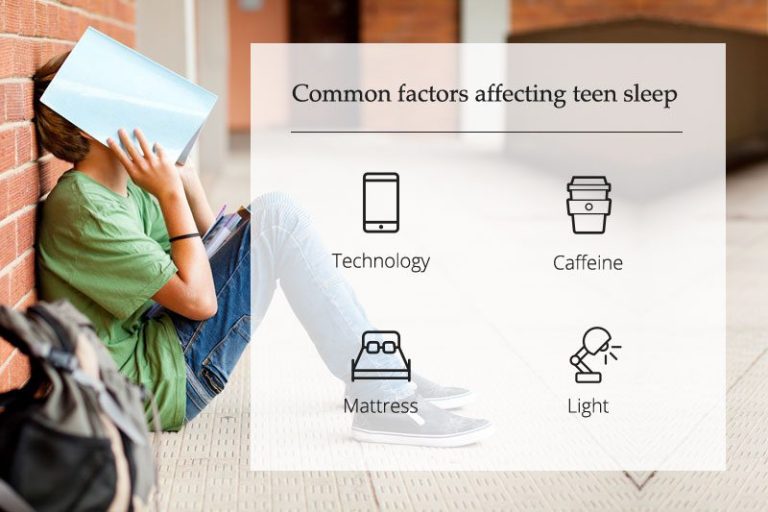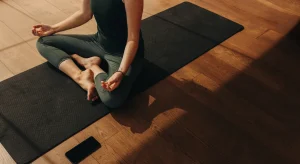
How much sleep do teenagers need?
According to the National Sleep Foundation, teenagers need 8-10 hours of sleep per night, more than what adults typically need. However, every teenager is different, some teens need more than the recommended amount of sleep per night, while others may require less.
How much sleep do Singaporean teens get?
Domestic data collected by Duke-NUS Medical School researchers found that secondary school students here report sleeping 6.5 hours on weekday nights.
During the teenage years, changes occur within the bioregulatory system controlling sleep. These changes include a delayed sleep onset, which means teenagers are often unable to fall asleep until later in the night. This would not be problematic if they could sleep later in the morning; however, school schedules typically require teenagers to wake up early.
We interviewed Dr. David Cunnington. Sleep Physician and Director at the Melbourne Sleep Disorders Centre and co-founder of SleepHub, who said, “At the same stage of life that teen need more sleep, their lives are getting busier. They have increased study requirements, are beginning to have independent social lives and have a number of other extra-curricular activities such as sports ” He adds, “Screen time can also make an impact on sleep.”
The current Gen Z teenagers face different challenges from the previous generation due to the adoption of round-the-clock technology, increased screen time for both entertainment and school work and artificial light exposure. More and more teenagers are using smart phones. tablets, televisions and gaming consoles late into the night. According to an interview conducted by Today.online, 14-year-old Ames Leung has been functioning on five to six hours of sleep on school days as he has chooses to engage with his routine gaming and online chats with friends after a busy day of school and extracurricular activities. Hence, he sleeps past midnight and then wakes at 6.30 am. The secondary 2 student considers himself an early sleeper amongst his friends as most of them continue gaming late into the night while he heads to bed at 12 am.

Barriers to healthy sleep
Common barriers to healthy sleep in local adolescents include later preferred sleep timing, lower parental supervision of bedtime, longer study time, early school start time, and longer travel time. Other causes of sleep-deprivation include light exposure and noise. If a teen’s room is too bright or noisy when trying to go to sleep, it can delay the onset of tiredness. In addition, if their mattress is uncomfortable, it can lead to tossing and turning throughout the night preventing quality sleep.
The effects of sleep deprivation on Teens:
What is the impact of sleep deficits on teens? Unfortunately, they have a ripple effect that impacts many aspects of life. Studies have determined that sleep deprivation causes concentration problems, drifting off, memory impairment, a shortened attention span, moodiness, aggression, depression, risky behaviour, and clumsiness. Sleep quantity and quality play an essential role in a teen’s development. It is linked to brain function, memory, language, and executive function (cognitive skills required for self-regulation and goal-led behaviour).
How can teenagers improve their sleep?
What can teens and their parents do to encourage adequate sleep? Here are some tips.
1. Control caffeine intake before bed

- Limit, or preferably eliminate, the intake of caffeine 7-10 hours before getting to bed.
- Remember, caffeine is not just found in coffee and energy drinks-it can also be in sodas, protein bars, chocolate ice cream, matcha and tea, to name a few. You may also want to check for caffeine in the ingredients of any health food or energising snacks you eat.
- If you do consume caffeine, try to do so in the morning so it is less likely to keep you up at night.
2. Know your ideal bedtime

- Identify what time a teen has to wake up and the ideal bedtime to get adequate sleep. Try to move closer to the perfect hours of sleep required per night.
- Dr. Cunnington advises, “‘Recognise sleep as a priority, rather than an inconvenience, and allow adequate time for sleep through the school week.”
3. Sleep in when you can

- Catch up on sleep in the mornings without scheduled activities.
- Also be cautious when planning early morning activities that will further reduce a teen’s sleeping hours.
4. Reduce screen time

- Reduce technology use 1-2 hours before bedtime.
- If not possible, use the night mode settings available on most smart phones and laptops. This reduces the blue light emissions from the devices and minimises the disruptive effects. It gives a softer and less glaring display that is easier on the eyes and may make it easier for teens to transition to sleep.
5. Encourage naps

- Take afternoon naps. If a teen is tired when they get home from school, it can be helpful for them to take a short nap.
- However, be mindful that if a nap is too long it may make it harder to fall asleep at bed time. It depends on the teenager’s schedule and how sleep deprived they are. Experiment with afternoon naps to see if they help a teen feel better during the day as well as to ensure they do not disrupt sleep at night
6. Set up a bed time routine

- Set up a relaxing bedtime routine and perform it every night. This could include taking a shower, drinking a caffeine-free calming tea like chamomile orginger, and recreational reading.
7. Turn off the lights at bedtime

- Keep the room dark at bedtime, as lights can interrupt your brain’s normal sleep-wake cycle. A common challenge to keeping a bedroom dark is the television, but streetlights outside the window can also let light in.
- An eye mask and blackout curtains can help create a dark and undisturbed sleeping environment.
8. Mind your sleep rules on weekend, too

- Staying up too late on weekends can make harder to sleep well during the week. Teens will naturally want to enjoy social events that run late, but finding balance is key. Try not to stay up late every weekend, especially if there’s no special event. If you do have a late night, aim to go to bed early the next day to
get back on track.
If you are a teen or a parent of a teen, sleep needs to be a priority. Unfortunately, without it, all other areas of waking life can eventually suffer. So take the time to analyse your current sleep habits, or that of your teen, and identify what steps you can take to encourage adequate rest. As a result, you or your teen will be better rested and equipped to give life 100% in all areas.





